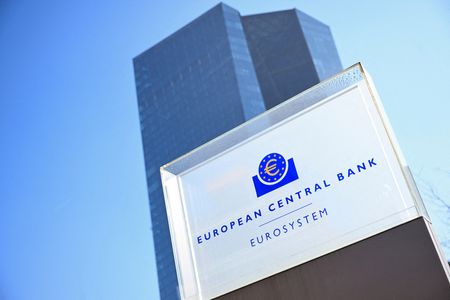FRANKFURT (Reuters) -ECB policymakers were already counting the potential cost of U.S. tariffs long before their introduction, arguing they would weigh on growth but have a more uncertain impact on inflation, the accounts of the bank’s March 5-6 meeting showed on Thursday.
The bank cut interest rates for the sixth time since last June at that meeting and kept the door ajar to further easing, but made no commitments about April given the uncertainty around Donald Trump’s tariff plans that were then still a month away.
“The point was made that the likely shocks on the horizon, including from escalating trade tensions, and uncertainty more generally, risked significantly weighing on growth,” the accounts showed on Thursday. “It was argued that these factors could increase the risk of undershooting the inflation target in the medium term.”
Such a combination of factors could even require decisive action from the ECB, some argued in March.
“From this perspective, it was argued that being prudent in the face of uncertainty did not necessarily equate to being gradual in adjusting the interest rate,” the ECB said.
However, policymakers cautioned that trade barriers could also cause a short-term surge in prices, especially if Europe responded in kind with its own measures.
“The combination of U.S. tariffs and retaliation measures could also pose upside risks to inflation, especially in the near term,” the ECB added.
Investors have increased their bets on another rate cut on April 17 in the weeks since that meeting and now see a roughly 90% chance of a move, to be followed by two more cuts later in the year, as inflation pressures are dissipating.
Tariffs announced by U.S. President Donald Trump are likely to weigh on growth and their economic damage could weigh on prices, policymakers have said.
The euro has also surged in recent weeks, bond yields have increased and energy prices are falling quickly, all pointing in the direction of easing pressure on prices.
But the outlook is far from clear. Europe is bound to retaliate against tariffs and that is certain to increase prices.
A fragmented world is also likely to increase costs for firms and raise inflation while increased spending on defence could also boost aggregate demand and thus prices.
“It was contended that high levels of uncertainty … called for caution in policy-setting and especially in communication,” the ECB added.
(Reporting by Balazs Koranyi;Editing by Alison Williams and Andrew Heavens)









